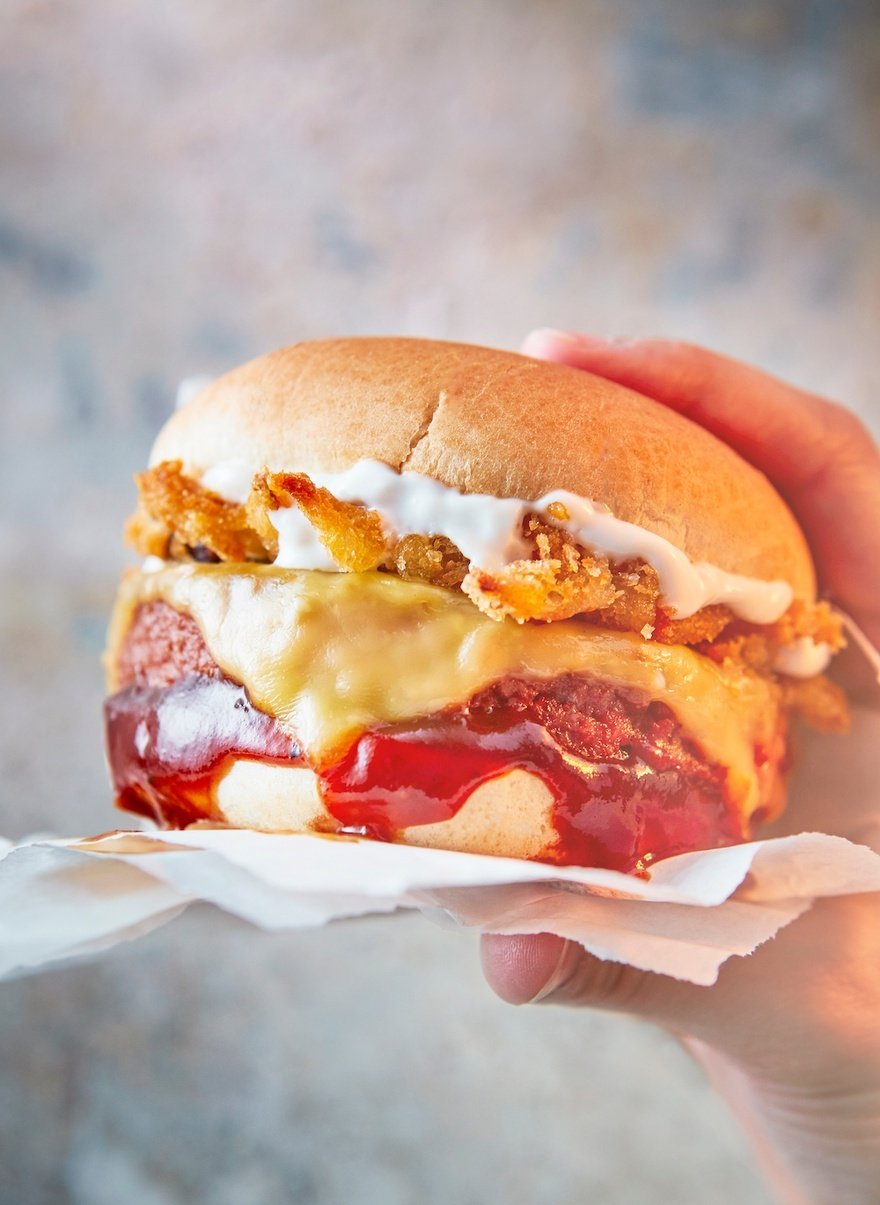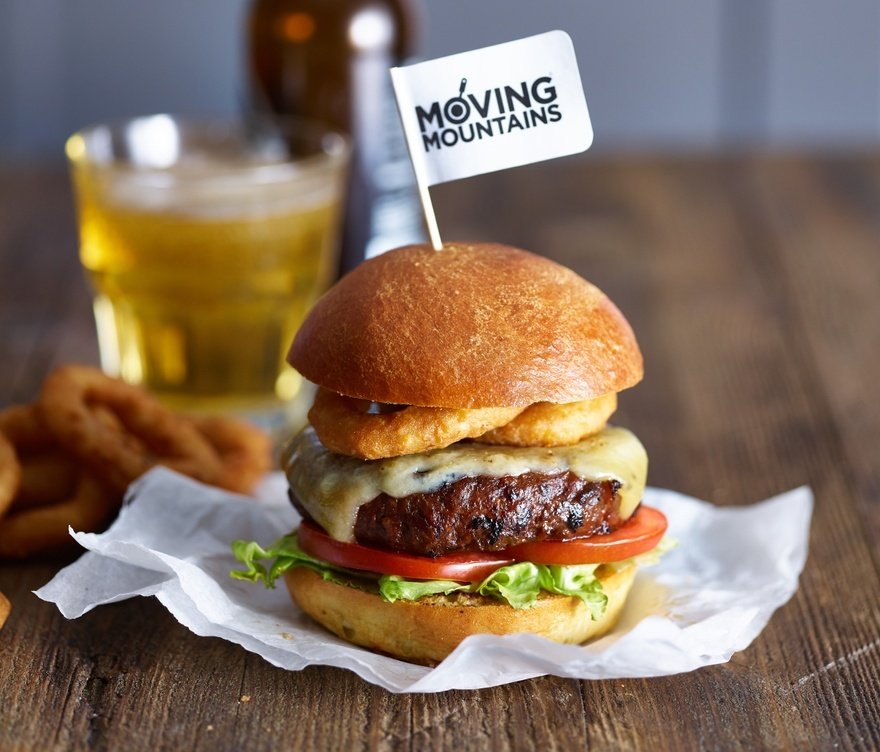The battle to create the most convincing meatless burger is hotting up, and chef Neil Rankin is the latest operator to try his hand, keeping his plant-based patty recipe a closely guarded secret. Andy Lynes meets him and talks to others championing the cause
Neil Rankin has built a career around meat. He worked with American chef and barbecue expert Adam Perry Lang at Jamie Oliver's Barbecoa and was head chef at Pitt Cue Co before heading up two branches of barbecue-focused gastropub concept the Smokehouse in Islington and Chiswick. He is currently a director and shareholder of the three-strong Temper steakhouse and barbecue restaurant group in London.
So it's something of a surprise to learn that his latest project, Simplicity Burger, due to open in east London in October, will be a meatfree zone and that Rankin has spent the last six months developing a burger made only of vegetables from his home.
The move makes sense, however, when you learn that the US-based company Beyond Meat, which manufactures plant-based burgers (as well as sausages and mince) and supplies Honest Burgers and All Bar One in the UK, was valued at £10b when it went public in May this year and has a share price of $189 (£152).
"There's so much scope for chefs to get involved in the vegan scene," says Rankin. "There's a big movement towards vegetable cookery – and brilliant vegetable cookery – so why not take that into the casual market, which is unexplored at the moment?"
Rankin is launching Simplicity Burger in partnership with David Lagonell, formerly executive chef of Smokehouse, and Andrew Fishwick, who previously owned the Truscott Arms in Maida Vale.
"The vegan movement is important for all of us," he adds. "It's important, strangely enough, for the meat industry to survive, because unless we start pulling back from it, we're going to see such a massive backlash – we need some good alternatives. People dismiss burgers as fast food, but they're culturally one of the most important things on the planet to eat. They unify people and bring them together and they're part of our industry. There just needs to be a better alternative to what's on the market at the moment."
Rankin is taking the unusual step of launching the restaurant without a definitive recipe for his meat-free burger and he intends to modify the product based on customer feedback. He is keeping the precise ingredients and cooking method a closely guarded secret.
"It's a fermentation of a mixture of vegetables that I think work well, but I'm still not there yet and I'm experimenting with different things.
"At the moment I'm adding vegetable fats but they contain loads of palm oil, so I'm trying to find an alternative. I'm using miso as well. It's a great ingredient, but I'd rather use something like seaweed that you can find in this country and is freely available.
"There are no beans in the burger and the idea of using pea proteins and all that chemist stuff – it just doesn't work on a scalability level. If you're looking at sustainability then you've got to be using food that we're chucking away; the things that are grown and without any waste. That's why I need the restaurant; I need to bump up the process a bit. Doing it at three o'clock in the morning in my pants at home is not the ideal way to change the world."
In order to keep costs down, Simplicity Burger will open in premises that are already fitted out as a burger restaurant and will be what Rankin describes as a "full-time pop-up".
"We're going to take it slowly; we're not going to go on Deliveroo and blast it out. The idea will be that the burger will change from week to week and we will listen to people and their feedback. Then, at the end of six or eight months, we might have something that we think we can share with the world. I've no idea whether it's going to work or not – its unchartered territory. That's why I'm not doing a multibillion-dollar opening."
Simplicity Burger won't be the first vegan burger joint in London, however. Former Tesla employee Ross Forder launched Halo Burger in a shipping container in the Pop Brixton business hub in 2018 after spotting a gap in the market for restaurants catering to flexitarians (a person who has a primarily vegetarian diet but occasionally eats meat or fish).
He says: "People are going vegetarian, vegan and flexitarian because of three key reasons: the environment, animal welfare and health, not typically because they don't like the taste of meat. You need to provide an experience and a product that doesn't ask them to compromise in any way on what they're used to eating and the environment in which they're used to eating."
Forder's original idea back in 2016 was to develop his own plant-based burger, but he soon abandoned the plan when he discovered Beyond Meat. "I flew out to California to try their products and, unsurprisingly, I was blown away. Being a vegetarian at the time – I'm now vegan – I thought, wow, this is exactly what I've been missing all these years. And then I thought, this is going to come to the UK eventually and we need to do something particularly special with it."
Beyond Meat burgers are made from peas, mung beans and rice and coloured with beetroot to resemble meat. They change colour as they cook and ‘bleed' when bitten into. The company has recently redesigned the burger, adding ‘marbling' in the form of coconut oil and cocoa butter to improve juiciness and texture.
The Halo Burger features two ¹⁄₈lb Beyond Burger patties, layered with diced, caramelised onion, two slices of melted American-style cheese, beef tomato, lettuce, pickles and a tangy house-made sauce. Halo has also developed its own seasoning, which is added to the patties.
"It's important to understand the American palate," says Forder. "There are nuances and differences within the UK palate. We did the tasting rounds in California and the UK just to see what the difference was and what the discrepancies were. We then adjusted our recipes."
Forder has also ensured that every element of the vegan burger is up to the standard of an animal-based burger.
"If you're trying to convince the staunchest of meat eaters that they don't have to compromise at all in what they're eating, then the cheese cannot taste vegan, the sauce cannot taste vegan. It needs to taste, melt and feel exactly how it would taste if it were based on animal products. And therein lies the difficulty: finding the right product in the right combinations at the right melting point to achieve that flavour profile and the consistency of the real thing. That took us a long time."
Moving Mountains
Beyond Burger is not the only company in the plant-based meat-alternative space. In July 2018, Simeon Van Der Molen, owner of plant-based detergents manufacturer Ecozone, launched Moving Mountains, selling about 500 burgers a week to Dirty Bones, the American-style comfort food and cocktail restaurant group with five outlets in London and Oxford. A year later, Moving Mountains is now supplying 500,000 burgers to restaurants around the world, including Hard Rock Café, Wahlburgers and Café Rouge.
"The increase is incredible, and certainly this year we have been inundated with enquiries from all over the world," says Van Der Molen. "We're supplying Australia, the US, the Far East and all of Europe. The UK and California are leading this trend, followed by Australia, but it seems to be sweeping across the world. The next six months looks like it's going to scale even faster and further and it's not just your vegetarian distributors – these are massive meat companies we're talking to, with billions of dollars of turnover. It's on trend."
Van Der Molen has so far ignored the supermarkets' request for products: "I predicted a few years ago that this boom was going to happen, and supermarkets would list just any old crap, which is basically what they're doing. We want a premium product in foodservice. The restaurant locations have to name us on the menu and help build our brand out of respect for all the work we've done for the product."
Van Der Molen, who was inspired to create Moving Mountains after being diagnosed with high cholesterol and told by his doctor to cut red meat from his diet, is unconcerned by recent reports in the press of vegan restaurants closing due to what The Telegraph called "a lack of interest in solely plant-based food".
"I follow a plant-based diet and I have never gone to a vegan restaurant in my life. The reason why they are closing is not because there is a lack of following, it's because the people that would have gone to those places can now buy foods such as ours from their local pubs. We supply Marston's, Stonegate Pub Company and Mitchells & Butlers. These small locations are suffering from competition from Marston's launching its own 10- to 12-item plant-based menu. There's certainly not a decline."
Forder is equally convinced about the long-term viability of plant-based meat alternative burgers, with plans for multiple sites domestically and internationally. Halo Burger is also extending its menu with the addition of ‘This isn't chicken nuggets', made from soy bean protein, water and pea protein, created by London-based company This.
"The movement towards meat-free isn't going anywhere. We believe if the general public are given an option that tastes as good or better than their usual meat option, with the added benefit of fewer greenhouse gasses, less water used, and zero animal cruelty, why wouldn't they take it?"
Moving Mountains is due to announce three new products this year or in early 2020 and aims to have a portfolio of 20 products within the next three years. Rankin also plans to make mince, meatballs, sausages and plantbased charcuterie in addition to the Simplicity Burger. That doesn't mean he's completely turned his back on meat; he remains involved with Temper, although he says he won't be putting plant-based meat alternative items on its menus, as he believes they wouldn't sell well to the restaurant's carnivorous customer base.
"I'm not against animal killing; I'm against over-consumption. I kept finding myself phoning up a butcher and ordering 300 ribs for the restaurants and it jarred me because I thought, ‘why do I need to do this?' There's been a wakeup moment, but it's been coming for a long time.
"Once the confidence comes in for plantbased restaurants and the funding starts more chefs are going to jump on board. What do you want to be remembered for at the end of your career: that you cooked a steak, or that you created something out of nothing? I think that's quite exciting, for anybody."











